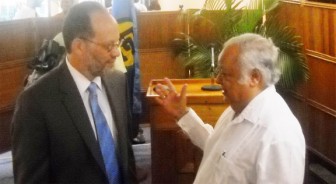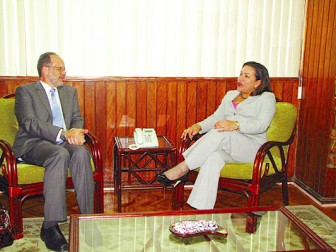Ambassador Irwin LaRocque yesterday morning became CARICOM’s seventh Secretary-General and identified the reformation of “the architecture and governance of our integration arrangements” as key if the Secretariat is to be more effective in its mandate.
Speaking at a simple ceremony at the Secretariat to mark his appointment, the Dominica-born LaRocque outlined the importance of the reviews commissioned by the CARICOM Heads concerning the operations of the Secretariat and related regional organisations.

“I eagerly await the findings of both reviews, since I am firmly of the view that the architecture and governance of our integration arrangements must be reformed if we are to be more effective and accountable in the discharge of our duties and functions,” he said. His appointment, he said, came at a time when the countries in the region were still feeling the impact of the global financial crisis and when countries are likely to face even more challenging economic times ahead. He said that the region was facing problems such as rising fuel and food prices and a reduced budget for the Secretariat.
Chairman of the CARICOM Heads of Government Dr Denzil Douglas, who participated in the ceremony by way of video conference, noted that LaRocque’s appointment signalled a new chapter in the life of CARICOM. He said that the priority must be given to implementing the recommendations made by the review teams.
LaRocque, 56, replaces Sir Edwin Carrington of Trinidad and Tobago, who stepped down from the post in December. Following Carrington’s resignation, Ambassador Lolita Applewhaite served as Acting Secretary-General for the organization. Both Carrington and Applewhaite were lauded for their contributions to the community during yesterday’s ceremony.

Meanwhile LaRocque also pledged that it will not be business as usual as it relates to the regional integration movement. “The message from all quarters is loud and clear: It cannot be business as usual,” he said, “And I take these words to apply not just to the CARICOM Secretariat but to all aspects of our integration—equally member states and regional institutions,” he added.
He pointed to “a general view out there that all things CARICOM, rightly or wrongly, are the purview of the CARICOM Secretariat.” “That is not necessarily the case,” he said. “But if it is determined that that is how it should be, then the requisite reforms must be undertaken. There cannot be responsibility without authority,” he emphasised.
He noted that key in advancing the process would be the availability of adequate resources. “We must be focused and adequately resourced, if we are to play the role envisaged by our Heads of Government,” he said. Among the priorities LaRocque identified are a more aggressive public education and information drive, fast-tracking of the implementation of the CARICOM Single Economy, development of the agriculture and services sectors, regulatory framework for the movement of capital and the creation of an investor-friendly environment.
He also reiterated the Secretariat’s commitment towards implementing the Caribbean Single Market and Economy (CSME), noting that a decision had been made to consolidate the gains made so far under the CSME before taking any further action on certain specific elements of the single economy, such as moving towards a single currency.
“I am very much aware that the pace at which the Community is advancing with the CSME does not meet the expectations of many,” LaRocque said. “From my own personal perspective, we should be much further along and I would like to see a significant improvement in implementation,” he said, while acknowledging that many of the member states face both technical and political constraints which cannot be ignored or easily overcome.
Before his appointment as Secretary General, LaRocque, since 2005, served as Assistant Secretary-General for Trade and Economic Integration at the CARICOM Secretariat. Prior to this, he served as Permanent Secretary in various ministries in Dominica for more than 14 years, including in the ministries of Trade, Industry, Enterprise Development, Tourism, and Foreign Affairs, where he headed the diplomatic service.
He also served as the principal advisor to the Government of Dominica on all matters pertaining to economic integration and regional and international trade. LaRocque was Dominica’s senior policy adviser on the revision of the original Treaty of Chaguaramas and served on the CARICOM Inter-Governmental Task Force, which drafted the Revised Treaty of Chaguaramas.
He was educated at Queen’s College and the New School for Social Research, both in New York, and New York University; he majored in Political Philosophy, Political Economics and Economics, respectively.




